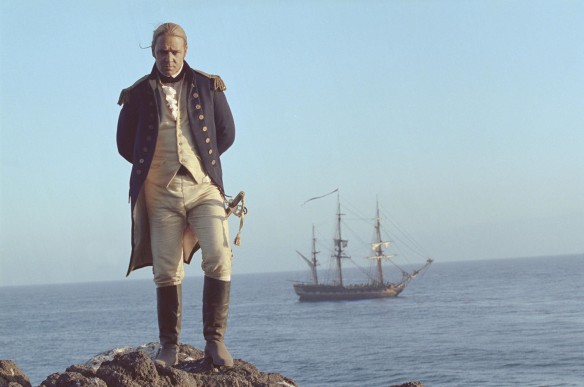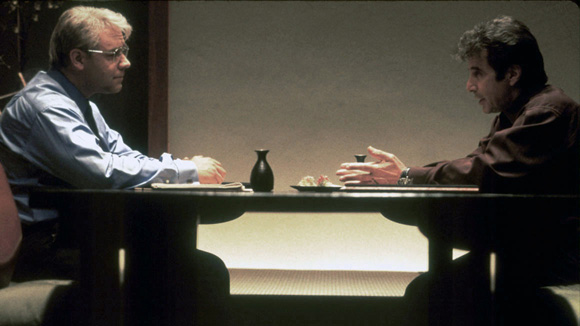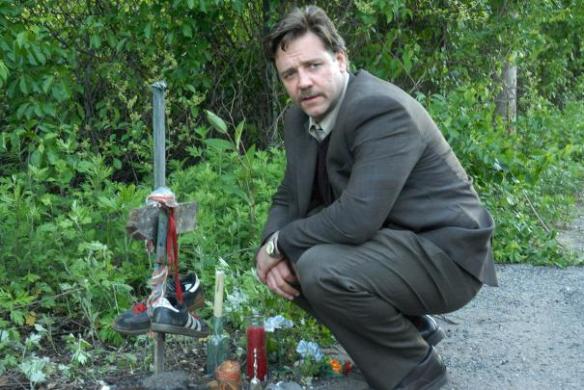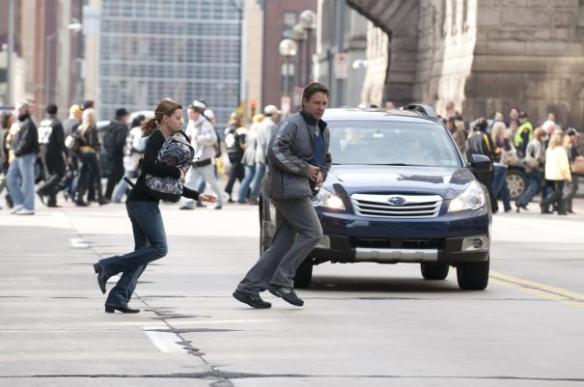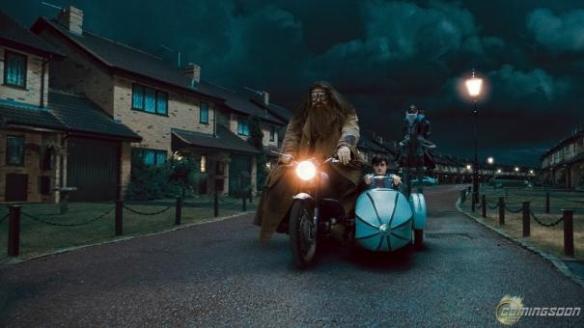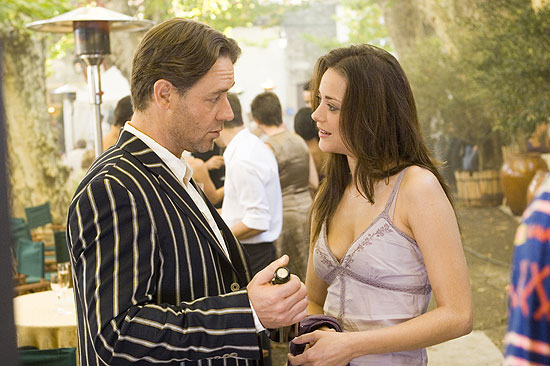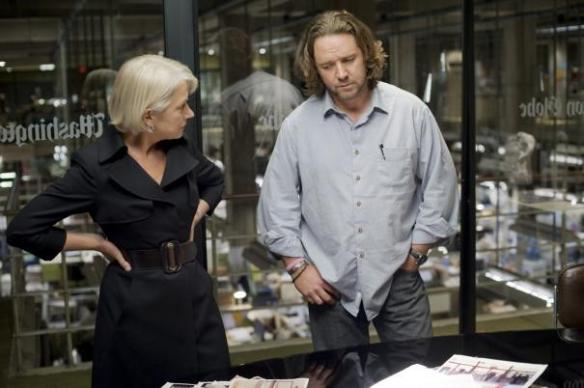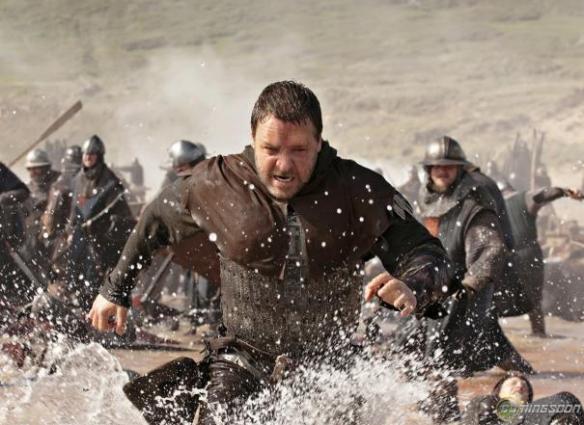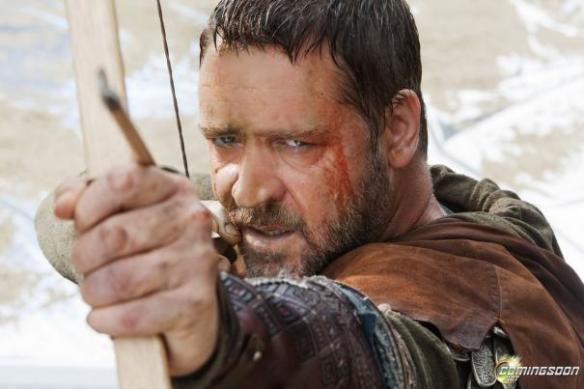(2003) Adventure (20th Century Fox) Russell Crowe, Paul Bettany, James D’Arcy, Edward Woodall, Chris Larkin, Max Pirkis, Billy Boyd, Jack Randall, Max Benitz, Lee Ingleby, Richard Pates, Robert Pugh, Richard McCabe, Ian Mercer, David Threlfall . Directed by Peter Weir
After years of fan clamoring, Patrick O’Brian’s revered Master and Commander saga finally made it to the big screen, and was given the royal treatment in Hollywood as befitted the beginning of a potential major franchise. It didn’t quite make it there but was that because the movie wasn’t up to snuff?
Captain “Lucky” Jack Aubrey (Crowe), master of the HMS Surprize, is given orders by the admiralty to track down the French warship Acheron in the waters off of the Americas and track it as far as Brazil, with the orders to take her if possible, and sink her if not. He commands a crew including the ship’s surgeon, Stephen Maturin (Bettany), who is an amateur naturalist as well as Aubrey’s best friend. The two often end their evenings by playing duets on violin and cello.
The Acheron proves to be a superior ship in size, firepower and speed, and creates havoc for the Surprize, which barely escapes sinking in battle. Aubrey must use all his wits to outwit his clever adversary, but also wrestles with his own motivations; does he chase the Acheron out of loyalty, duty or pride? And what price will he pay to find the answer to that question?
The Master and Commander books are very well researched. The 20-novel series features detailed accounts of life in the British Navy in the Napoleonic era, as well as battle tactics, the political climate of the times and life in general at the dawn of the 19th century.
That a movie was to be made of it was met not only by the anticipation I mentioned but also a healthy amount of skepticism as well. Fans of the series (and they are a rabid lot) were concerned that the careful, meticulous research O’Brian put into the novels might be washed away in a storm of Hollywood clichés and shortcuts.
Well, there was reason to celebrate (and reason for dirges — more in a moment). Although Russell Crowe is perhaps too Hollywood-handsome for the role of Aubrey (he is described in the books as being a bit on the pudgy side and Crowe’s casting in the role made purists howl), he carries the charisma of a leader of men. His performance is such that you believe he is the kind of man you yourself would follow without hesitation to the gates of Hell and back. In that sense, he caught the essence of the character if not the physical embodiment.
The movie also captures the brutal and cramped conditions in which swabbies of the British Navy lived and worked. Better still, the raw courage it took to fight a naval battle is noted, as cannon fire obliterates hulls and decks, causing wood to splinter in a thousand directions, acting as lethal darts. Rarely are the cannonballs themselves seen by the naked eye, but the damage they inflict to vessel and flesh is well in evidence. The battle scenes are absolutely terrifying to behold.
The movie is well-cast even down to the extras who possess faces that have the look of the 19th century; most bear scars of battle, or the more insidious scars of years of toil on a tiny vessel in the midst of the unforgiving ocean, imperiled by both the elements and merciless foes. Whether those scars were put there by make-up or were there to begin with, they go a long way in establishing the film’s authenticity, which I have to say overall seemed pretty believable to my admittedly inexpert eye.
Aubrey is a decent sort but a stern taskmaster as captain; he knows the crew’s ability to perform amid hellish cannon fire and terrible storms will mean the difference between returning home or taking a long nap in Davey Jones’ locker. The discipline was by necessity brutal and if anything is understated here.
Weir filmed on the Galapagos Islands, one of the most remote and fascinating places on earth. It is where Charles Darwin was motivated to formulate his Theory of Evolution, and remains today, due to preservationist efforts, nearly pristine. The scenes with Maturin on the island are priceless and are among the movie’s highlights.
But there are a few marks against the film. In the novels, the American Navy was Aubrey’s adversary. Here, perhaps so that the American audience isn’t offended, Aubrey fights the French. Also, some of the expository scenes drag, leading to the audience shifting in its seats uncomfortably during the two and a half hour movie. Audiences are more ADHD than ever these days; I can’t imagine one sitting through this without whipping out cell phones to check for messages and texts at least once.
Crowe is in my opinion one of the most compelling stars in Hollywood; at this point in his career he’d hit his stride not only as an actor but as a screen presence, the very definition of stardom. The movie is much better when he’s onscreen than when he’s offscreen. Also, his chemistry with Paul Bettany as Maturin is undeniable; they bicker, but they are still the closest of friends, and the two play well off each other.
Weir walks a tightrope over a pool of hungry sharks just in making this movie and I think he does as good a job as it’s possible to do under the circumstances. The ship’s interior is made to feel cramped without making the audience too claustrophobic. The emptiness of the ocean and the isolation of the English vessel on it is noted but not overdone. And while he did compress some of the action, eliminate scenes and beloved novel characters, he makes the movie lively for most of the running time.
Master and Commander: Far Side of the World is an epic piece of filmmaking in every sense of the word. While the storyline may not be new, it is well-told. It is a combination action movie, adventure flick and history lesson all rolled into one neat package. Students of history will love this one, as much if not more so than lovers of action. It’s a shame that this franchise never made it past the first movie.
WHY RENT THIS: Epic battle sequences. Crowe at the top of his game. Combination action movie/adventure/history lesson.
WHY RENT SOMETHING ELSE: About half an hour too long. Drags in places. Differs in critical places from the book.
FAMILY MATTERS: Some of the battle sequences are intense and gruesome. There are a few bad words now and then.
TRIVIAL PURSUITS: The first movie ever to film in the Galapagos Islands.
NOTABLE HOME VIDEO FEATURES: The two-disc DVD Collector’s Edition has a wealth of features including a look at the historical accuracy of the books and the film’s endeavors to follow as closely as possible in accuracy, including getting authentic period props. This is oddly missing from the Blu-Ray edition, which does have a trivia track and a map overlay which shows you the positions of the Suprize and the Archeron at various points in the film.
BOX OFFICE PERFORMANCE: $212.0M on a $150M production budget; the movie wasn’t financially successful.
COMPARISON SHOPPING: Captain Horatio Hornblower, RN
FINAL RATING: 8/10
NEXT: The Expendables 2

